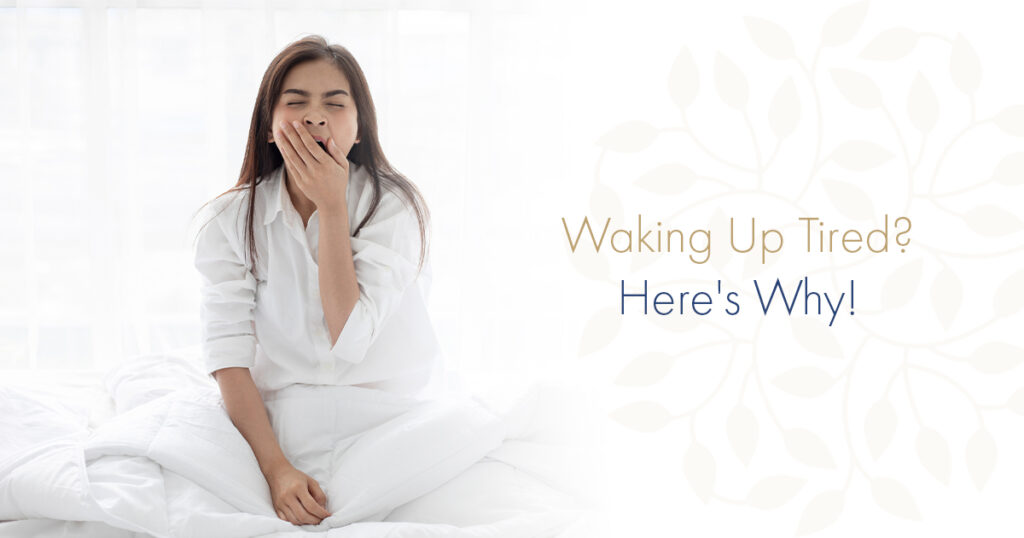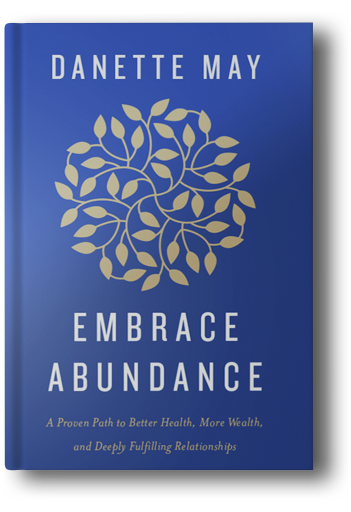Did you wake up this morning feeling refreshed and energized? Or did you drag yourself out of bed feeling groggy and still tired? While it’s not uncommon to wake up feeling a little groggy from time to time, if you find yourself waking up tired more often than not, it may be time to do something about it.
If you regularly wake up tired, and continue to feel sluggish throughout your day, there could be something else going on. But before you reach for an over-the-counter solution, take a look at these common reasons why you’re likely waking up tired — and what you can do to fix them naturally.

6 Reasons You Wake Up Tired
1. You’re just not getting enough sleep
Let’s start with one of the simplest and most common reasons. You’re just not getting enough sleep. While there are some people who have a genetic mutation that allows them to actually function well on far less sleep than others, they only account for about 1% of the population. So, chances are you’re not one of them.
For optimum health, adults need seven to nine hours of sleep each night, suggests the American Academy of Sleep Medicine. Less than seven hours of sleep each night and you’re not only waking up groggy, you’re also setting yourself up for possible weight gain, disease, depression, and increased risk of death.
The solution here is clear: it’s time to prioritize a sleep schedule that allows you to get at least 7 hours of sleep every night.
2. You’re hitting the snooze button
Those extra nine minutes of sleep after you hit the snooze button might feel too good to resist, but the truth is it’s not giving your body the chance to return to a restorative level of sleep and can actually make you feel even groggier when you do finally get out of bed.
In fact, hitting the snooze can wake you during different stages of sleep. And if you’re disrupted during late-stage REM sleep, it may cause a ‘fight or flight’ response, which increases your heartbeat and blood pressure. Truthfully, that’s not a great way to start your day. If you find yourself hitting the snooze button often, then it’s time to reevaluate how much sleep you’re actually getting each night.
3. You’re sleep hygiene needs work
So, what exactly is sleep hygiene? Sleep hygiene is all about your bedtime habits, which either promote a good night’s sleep or result in poor sleep. Poor sleep hygiene contributes to waking up tired and may consist of:
- Not having a regular sleep schedule, which includes changing your regular sleep and wake time.
- Frequently napping for longer than 30 minutes throughout the day.
- Using your smartphone and computer screens close to bedtime.
- Sleeping in a room that’s either too hot or too cold.
- Sleeping on a mattress or pillow that’s uncomfortable.
- Eating late into the evening, or drinking caffeinated beverages before bed.
The best way to start improving your sleep hygiene is to implement an evening routine that includes screen-free time, relaxing activities, and a consistent bedtime.
4. You enjoy one too many nightcaps before bed
Sure, alcohol can make you feel sleepy thanks to its depressant effects. But the consumption of alcohol before bed has been associated with difficulty falling asleep, lower quality sleep, and a higher likelihood of waking up throughout the night.
In addition, that nightcap before bed is also connected to delta activity, which is linked to restlessness. Plus, alcohol hinders REM sleep — the most restorative phase of your sleep — which can lead to waking up tired. To reduce the negative effects of alcohol on sleep, it’s best to stop drinking at least 4 hours prior to bedtime.
5. Your circadian rhythm is out of whack
Your circadian rhythm is your internal body clock that regulates your sleep–wake cycles. Sometimes your circadian rhythm changes due to lifestyle factors and sometimes it just changes with age. Here’s how to determine if your circadian rhythm is out of whack.
- You feel sleepy throughout the day
- You have trouble concentrating
- You have difficulty making decisions
- You’re not performing tasks as well as you could
Your internal body clock can dictate if you’re a morning person, or more of a night owl, suggests research in the journal Nature Communications. Either way, creating the right bedtime routine can help you feel fresher and more alert each morning.
6. You’re not good quality sleep
So, you’ve perfected your sleep hygiene, implemented healthy sleep habits throughout your day, and you’re sleeping at least seven hours each night; yet, you’re still waking up tired. It could be that you’re not getting enough restorative deep sleep.
There are various stages of sleep and one of the most important stages is deep sleep. It’s during deep sleep that your brain rests and recovers from thinking. Deep sleep also helps balance hormones, heal the body, and regenerate new cells. If nothing seems to be helping, it might be time to talk to your doctor to check for underlying conditions such as sleep apnea.
Sleep Tip: Try Golden Superfood Bliss
To help promote deeper sleep, wake up refreshed, and feel energized throughout your day, try adding Golden Superfood Bliss to your nightly routine. *
Golden Superfood Bliss is a blend of 12 powerful ingredients including turmeric, ashwagandha, amla fruit, ancient mushrooms, and more. Sipping this tasty elixir before bed can help:
- Improve the quality of your sleep*
- Soothe occasional anxiety*
- Balance stress and reduce cortisol by up to 28 percent*
- Boost mental function*
- Fight temporary inflammation*
- Improve digestion*
- Boost your metabolism*
- Increase fat loss*
Golden Superfood Bliss can help you fall asleep faster and stay asleep longer, all while crushing hunger cravings and helping relieve stress. Click the link below to get yours today!
Shop Golden Superfood Bliss Here!
*These statements have not been evaluated by the Food and Drug Administration. These products are not intended to diagnose, treat, cure, or prevent any disease.






